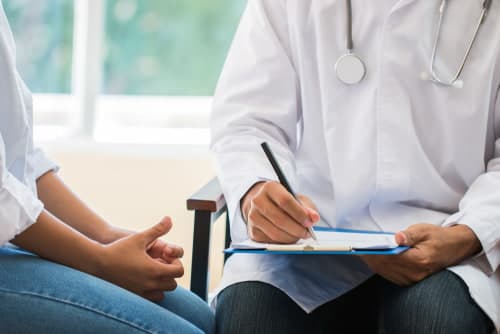Opioid Use Disorder and Treatment
Opioid Addiction Information
Opioid Addiction Treatment
Rehab Features & Amenities
What Are Opioids?
Opioids are a class of drugs derived from the opium poppy plant that includes both prescription painkillers and the illegal street drug heroin.
Common prescription opioids include:2
- Oxycodone (OxyContin, Percocet).
- Hydrocodone (Norco).
- Morphine (Duramorph, Kadian).
- Hydromorphone (Dilaudid).
- Fentanyl (Duragesic , Actiq, Subsys).
- Methadone (Methadose).
- Codeine.
- Tramadol (Ultram, Conzip).
Opioid Effects & Risks
Opioids are effective at reducing pain and at producing other pleasurable feelings, such as relaxation and euphoria. However, the effects are not all positive.

Opioid Overdose Symptoms
Opioid overdose symptoms can include:9
- Pinpoint (tiny) pupils.
- Loss of consciousness and cannot be awakened.
- Very slow and shallow breathing.
- Slowed or absent pulse.
- Vomiting or gurgling or choking noises.
- Limp body.
- Cold, pale skin.
- Fingernails or lips are purple or blue.
Combining opioids with other substances, like benzodiazepines, alcohol, or xylazine can increase your risk of overdose and death.10

Unsure If You Are Witnessing an Overdose?
It is not always immediately clear if someone is overdosing on opioids, but it is crucial to seek immediate medical attention if you think someone you’re with may have overdosed.
- Immediately call 911 and stay with the person at least until emergency personnel arrives.
- Lay the person on their side to prevent choking.
- If you have naloxone (Narcan)— the FDA-approved opioid overdose reversal drug—on hand, you should administer it immediately. If the person has not overdosed on opioids, it will have no effect.11

Opioid Addiction Treatment
The first step in treating an opioid use disorder is going through the withdrawal process. Opioid withdrawal syndrome can be severely uncomfortable. The signs and symptoms of opioid withdrawal can mimic that of the flu and may include sweating, runny nose, nausea, vomiting, racing pulse, and other distressing symptoms.12,13

Opioid Addiction Treatment at AdCare
During inpatient rehab at AdCare, patients struggling with opioid addiction may begin with detox and move directly into a residential program.
For those who prefer outpatient therapy after detox, AdCare offers multiple levels of outpatient addiction treatment.
For questions about how to get admitted to rehab for opioid addiction, call us today at .

FAQs
Opioids work by binding to the opioid receptors in your brain to dull feelings of pain and create feelings of well-being.17,18
All opioids—even those prescribed to you—have risks, including the potential for misuse and addiction. Taking prescription opioids to relieve pain for a short time is generally safe when taken only as prescribed but it does not eliminate the inherent risks of opioids.
If you have concerns about the safety of a drug prescribed to you or have a personal or family history of substance misuse, you can speak with your physician. He or she can discuss with you the risks vs. benefits of prescription painkillers and go over any alternatives for pain relief.17
Exactly how long it takes to develop a physiological dependence on opioids varies by individual, but it can happen quickly for some people—within a couple of weeks.19
No, alcohol and prescription opioids both slow your breathing, and taking them together can slow it to dangerous levels, potentially resulting in a fatal overdose.10
It is possible to detox from opioids alone; however, the withdrawal can be very intense, and many people seek medical support to ease the discomfort and prevent them from returning to opioids for relief.12
Medication provided in a detox facility by qualified staff can keep you safe and comfortable and help you avoid relapse.12
Opioid use during pregnancy may result in the baby being born dependent on opioids and going through withdrawal symptoms after birth (known as neonatal abstinence syndrome).2
If you are currently pregnant and using opioids, do not stop taking them without talking to your doctor because you can put your baby at risk. Speak to your physician about the safest way to end your opioid use.2